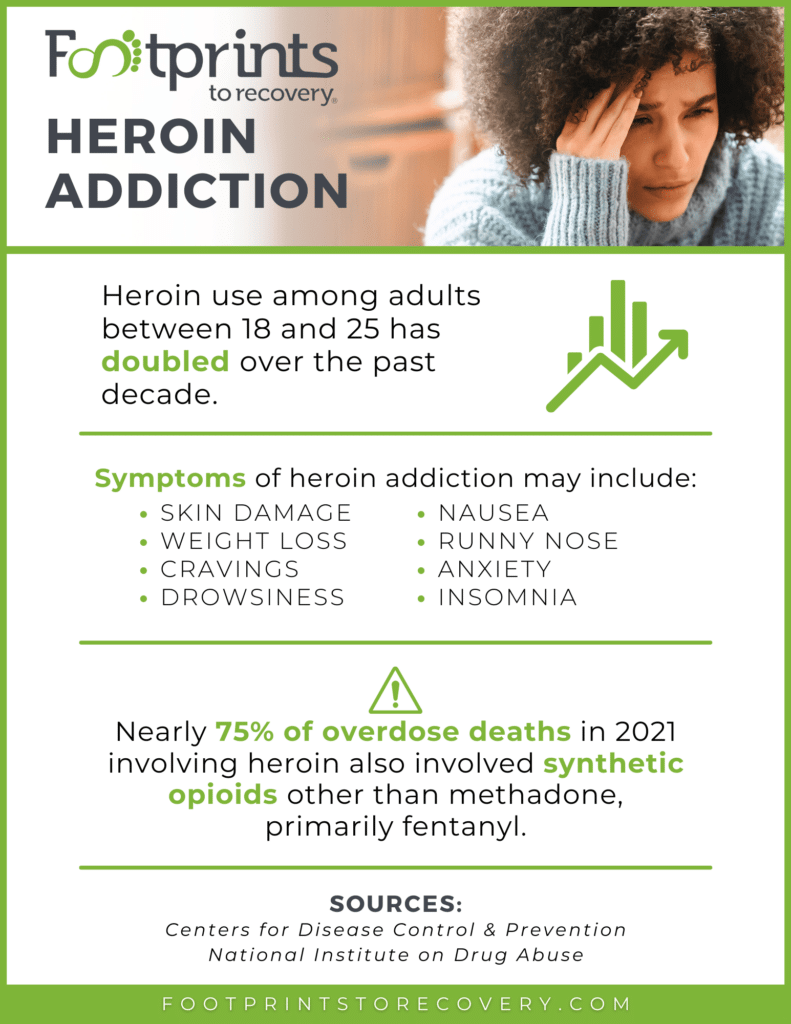Skip To Section:

Heroin is one of the most addictive, potent drugs you can take. Even if you want to stop, the idea of quitting may feel emotionally or physically impossible. If you are struggling with heroin use, it’s important to reach out for support. Professional heroin addiction treatment can help you get your life back.
Heroin Addiction Signs
If you’re using heroin frequently, you are most likely addicted to it. You have a diagnosable opioid use disorder once you begin to use heroin frequently and develop tolerance or physical dependence. This means when you can’t get heroin, your body suffers the physical effects of heroin withdrawal, like:
- Severe pain
- Anxiety
- Nausea
- Irritability
- Cravings
There are many health problems associated with heroin abuse. Some physical effects of heroin include:
- Finding you need more heroin to get the effects you once felt with smaller doses
- Experiencing the early stages of heroin withdrawal when you stop taking the drug: headaches, shakiness, irritability, and achiness
- Frequent runny noses or nosebleeds
- Respiratory issues – People who smoke heroin often have more chronic respiratory problems.
- Teary eyes and pinpoint pupils
- Needle marks or track marks where the drug is injected
- Skin abscesses at the injection sites
A heroin addiction affects more than just your body. You might also:
- Have problems controlling your drug use
- Continue to use heroin even though it causes you significant problems
- Experience declining performance at school or work
- Have financial difficulty due to spending large amounts of money on heroin
- Neglect your personal hygiene and responsibilities
- Notice your relationships are affected by anger and abuse, trust issues, secrecy, and codependency
If you want to break free from your heroin addiction but feel like you can’t, it’s time to seek help. Recovery takes work, but it is possible. At Footprints to Recovery, we are ready to support you.

How Do You Treat Heroin Addiction?
First, it’s important to remember that addiction is a disease. It’s not a choice or a moral failing. Addiction often results from dramatic changes in brain chemistry. Researchers, doctors, and therapists generally agree: Addiction is a mental illness.
There are several components to heroin addiction treatment and recovery. They include things like:
- Evaluations
- Medical detox
- Withdrawal management
- Long-term therapies
- Aftercare
Dual Diagnosis Treatment
Dual diagnosis treatment is an important part of recovery for people struggling with heroin addiction. This type of treatment addresses both the addiction and any underlying mental health issues. Often, people turn to drugs like heroin to self-medicate conditions like anxiety and depression. This is known as a dual diagnosis or co-occurring disorders. Dual diagnosis treatment can break this cycle by providing medication and therapy to treat both the addiction and the mental health disorder. Without addressing both issues, it can be difficult to stay sober long-term.
Behavioral Therapies
A behavior therapy program is an important part of addiction treatment. These therapies can help you change your behavior and adopt new, healthier coping skills. Common types of behavioral therapy used at addiction treatment centers include cognitive behavioral therapy (CBT), contingency management, and motivational interviewing (MI). Each of these therapies has been shown to be effective in treating heroin abuse.
CBT helps you identify and change the thoughts and behaviors that contribute to drug abuse. Contingency management provides rewards for abstaining from drugs, while MI helps you explore your motivation for change. These therapies can work together to help you develop the skills to abstain from drugs and lead a healthier life.
Relapse Prevention Training
Relapse prevention training is an important part of addiction treatment. It helps people in recovery learn to identify and manage triggers that could lead to a return to drug use. The goal of heroin relapse prevention training is to help you develop a solid plan for avoiding relapse and staying sober.
Addiction rehab centers typically offer relapse prevention training as part of a comprehensive treatment program for heroin abuse. The program may include individual and group therapy, 12-step meetings, and other types of support. During relapse prevention training, you will learn to identify high-risk situations, manage cravings, and communicate effectively with loved ones. These skills can help you make lasting changes and stay on the path to sobriety.
Self-Assessment: Am I Addicted?
"*" indicates required fields
What Medications Treat Heroin Addiction?
Medication assisted treatment (MAT) for heroin addiction is designed to help people manage their addictions while they undergo counseling and other forms of therapy. There are a few different types of medication that can be used. The most common are:
- Methadone
- Buprenorphine
- Naltrexone
Each medication works in a different way to help reduce cravings and withdrawal symptoms. They can be used alone or in combination with each other.
FDA-approved medication-assisted treatment includes:
Buprenorphine
Buprenorphine works by binding to the same brain receptors as heroin, but with a much weaker effect. This reduces the cravings and withdrawal symptoms of heroin addiction, making it easier for you to stop using.
Buprenorphine comes in both pill and sublingual tablet form. The sublingual tablets are designed to dissolve under your tongue, so they can be taken without water. Buprenorphine is usually taken once a day, but the dose may be increased or decreased depending on your response to the medication.
Naltrexone
Naltrexone works by blocking the effects of opioids, which reduces the incentive to use them. It’s typically taken as an oral tablet, but it can also be injected. The injection form is known as Vivitrol and is given once a month. Research has shown naltrexone can help people stay in treatment and reduce their use of heroin.
Methadone
Methadone is a synthetic opioid that works by binding to the same brain receptors as heroin. It does so with much weaker effects than heroin. This allows people to avoid the withdrawal symptoms and cravings associated with quitting heroin, while still maintaining some level of function. Methadone is typically taken daily in liquid form, and the dose is slowly increased over time until it reaches an effective level. Methadone must be administered at a licensed methadone clinic.
All MATs must be combined with behavioral therapy to provide the best chance of success. In some cases, MAT can also be used to help people who are struggling with alcohol addiction.
What Type of Heroin Addiction Treatment Is Right for Me?
There are several levels of addiction treatment available. You first must decide whether you need inpatient or outpatient treatment. Treatment professionals can help you make this choice during your initial assessment with a treatment center like Footprints to Recovery. Heroin is such a powerful addiction that many people require residential treatment for early recovery. This gives you space from the strong triggers to use that come up in early recovery.
Heroin rehab programs include:
Inpatient Treatment
Also known as residential rehab, inpatient treatment is required for medical detox. It allows you to get necessary medical treatment and isolate yourself from potential temptations to use heroin. If you have a long history of heroin abuse with several attempts to quit, you will probably benefit from inpatient treatment. This includes residential treatment and 24/7 medical support and care. Residential treatment clients follow a structured routine each day. They also receive full access to all amenities. The length of treatment ranges from 28 to 90 days, depending on the severity of your addiction.
Outpatient Treatment
Outpatient care allows you more freedom, but you need a safe home environment and a strong support system in place. If you don’t have these things, you can stay in a sober living home while undergoing outpatient treatment. The different levels of outpatient rehab include:
Partial hospitalization programs (PHPs) – A PHP provides intensive, comprehensive care for people struggling with addiction. PHP programs typically involve a variety of therapies and activities, such as:
- Group therapy sessions
- Individual counseling
- Skill-building workshops
PHPs can bridge the gap between traditional inpatient care and outpatient care, offering a high level of support and structure while allowing you to live at home or in a sober living residence. You attend a full day of treatment and leave in the evening.
Intensive outpatient programs (IOPs) – IOPs provide a level of care between traditional outpatient addiction treatment and inpatient treatment. They offer more structure than regular outpatient programs but allow you to continue working or going to school while receiving help for heroin addiction. These programs typically meet three to five days per week for three to four hours each day. Many IOPs use a combination of individual therapy, group therapy, and 12-step meetings to help patients recover from addiction.
Outpatient programs – Outpatient programs provide weekly treatment while you continue to live at home and go to school or work. These programs typically involve meeting with a counselor or therapist on a regular basis, attending group meetings, and participating in individual and/or family therapy. Outpatient programs can be very helpful for people who are dealing with mild to moderate addiction and who have a strong support system in place. They can also be a good step down from an inpatient program for people who have completed detox and treatment and are ready to start rebuilding their lives. Outpatient programs usually meet for one to three hours each week.
Most professionals recommend long-term treatment for heroin addiction. The length of treatment varies, but many people benefit from receiving clinical services for several months. Some people continue with therapy or peer-led support groups for several years. Even after you leave treatment, your sobriety will benefit from continuing care. Peer support and continuing to learn will help you maintain a healthy, drug-free lifestyle.
What Is Heroin Withdrawal Like?
Detox is the first step to treating heroin dependence and addiction. At the beginning of detox, your body works hard to cleanse itself of toxins accumulated through heroin use. Throughout detox, the body processes substances in your system, clearing those toxins out.
Heroin withdrawal symptoms during this time may include:
- Nausea
- Vomiting
- Diarrhea
- Muscle pain
- Bone pain
- Fatigue
- Insomnia
- Anxiety
- Depression
- irritability
- Drug cravings
Withdrawal symptoms typically peak within the first few days of detox and then gradually subside over the next week or so. However, some people may experience lingering symptoms for months after stopping heroin use. These symptoms are known as post-acute withdrawal syndrome (PAWS). PAWS can include anxiety, depression, and insomnia.
While detox is the first step in overcoming heroin addiction, it’s not a standalone treatment. In order to achieve long-term sobriety, you will need to participate in additional treatment steps, such as therapy, counseling, and 12-step programs.
You should not attempt to detox from heroin on your own. A detox center program ensures you’re safe and as comfortable as possible during heroin withdrawal. Medical professionals monitor you around the clock and attend to any medical emergencies. They also provide medications that can ease withdrawal symptoms and cravings.
At Footprints to Recovery, we offer medical detox, which puts you under the care of medical professionals who support and monitor you throughout withdrawal. Medical detox is a three-step process:
- Evaluation
- Stabilization
- Preparation for future treatment
How Long Is Heroin Detox?
The timeline of heroin withdrawal and the detox process depends on multiple factors, including:
- The length of time you used heroin
- The amount of heroin you took each time
- How frequently you used
- The method by which you took heroin
- The presence of underlying medical or mental health issues
Typically, the detox process lasts around a week, but it can be shorter or longer for some people. Symptoms typically begin within 6 to 12 hours of the last dose and can peak within 1 to 2 days. However, withdrawal symptoms can also last for weeks or even months in some cases.
Facts About Heroin Addiction
Recent addiction statistics by The Substance Abuse and Mental Health Services Administration (SAMHSA) on heroin and other opioids show that in one year:
- 902,000 Americans used heroin.
- Around 667,000 Americans abused both prescription painkillers and heroin.
- 2.7 million Americans met the criteria for an opioid use disorder.
- Over 9 million Americans misused opioids.
- Prescription painkillers were the most misused opioid (9.3 million people).
- Americans over the age of 26 were most frequently diagnosed with an opioid use disorder (2.3 million).
Other heroin facts:
- It is made from the opium poppy plant.
- Heroin is usually injected, snorted, or smoked.
- Short-term effects of heroin include feelings of euphoria, dry mouth, and heavy limbs.
- Long-term effects of heroin include addiction, collapsed veins, and an increased risk of infection and overdose.
- Heroin use can lead to death from respiratory failure or cardiac arrest.
- Heroin is illegal in the United States and most other countries.
Long-Term Effects of Heroin on the Brain and Body
The long-term effects of heroin are far-reaching and devastating. This powerful drug hijacks your brain, causing changes in the way it processes information and affects mood. Over time, heroin abuse can lead to:
- Cognitive impairments
- Mental health problems
- Physical health problems
- Addiction
- Overdose
- Death
People who use heroin often suffer from a range of physical health problems. These problems can include:
- Collapsed veins
- Infections of the heart lining and valves
- Liver disease
- Pneumonia
Heroin abuse can also lead to an increased risk of contracting HIV/AIDS and other diseases.
Perhaps the most tragic effect of heroin abuse is overdose. Each year thousands of people die from heroin overdoses. Overdoses often occur because people build up a tolerance to the drug and then take more than their bodies can handle. Heroin overdoses can also come from dangerous substances that heroin is often cut with, such as fentanyl or by taking heroin with other substances that depress the respiratory system.
What Is Heroin Addiction Treatment at Footprints Like?

Heroin Rehab typically begins with a thorough evaluation by treatment staff to determine the intensity of heroin abuse. They will evaluate how it affects your:
- Emotions
- Physical functioning
- Social functioning
- Thinking abilities
You will be evaluated for any other substance abuse issues or co-occurring mental health disorders during the admissions process. This evaluation will help the clinician develop a treatment plan that’s right for your needs.
Drug addiction treatment begins with medical detox and withdrawal management. Heroin withdrawal may require medication-assisted treatment (MAT). Medications like Suboxone or methadone can help effectively manage heroin withdrawal symptoms.
Therapy is a key component of any addiction treatment. At Footprints to Recovery we use various forms of behavioral therapy, cognitive behavioral therapy (CBT), and other complementary therapies.
These therapies help you get to the roots of your drug addiction through evidence-based methods and techniques with a team that’s experienced and compassionate.
Addiction treatment is effective and engaging, so you stay motivated in your recovery. Treatment approaches we use may include:
- Individual therapy
- Group therapy
- Family counseling
- Art therapy
- Music therapy
- Nutrition counseling
- Fitness
- Yoga
- Trauma therapies like EMDR (eye movement desensitization and reprocessing)
- Psychodrama
- Experiential therapy
- Depression treatment
- Anxiety treatment
- Trauma treatment
Preventing Relapse After Heroin Treatment
it’s important to remember that you are not finished once you complete a structured treatment program for heroin addiction. Aftercare focuses on your recovery and will help you avoid relapse by developing the skills you need to live a drug-free life.
To prevent relapse, you must engage in practices that help you maintain your sobriety. We encourage you to see sobriety as a fulfilling journey. After you’ve finished your stay at Footprints to Recovery, we’re still here to help. You can increase your chances of successful addiction recovery by participating in sober and supportive activities, such as support groups, step-down programs, and sober living.
Does Insurance Cover Drug Rehab for Heroin?
Most insurance plans cover at least a portion of drug rehab costs. The amount covered varies from plan to plan. Some plans only cover inpatient treatment, while others also cover outpatient treatment.
Many insurance companies have a predetermined maximum amount they will pay for drug rehab center services. If the cost of heroin rehab exceeds this amount, you will be responsible for the remaining costs.
At Footprints to Recovery, we accept most insurance plans, and we’ll work with your insurance to ensure the best coverage possible. You can get started on insurance verification here.
Get Help Today
Are you ready to get help for your heroin addiction? We are here for you. Contact Footprints to Recovery today to speak to one of our admissions coordinators and begin your journey to health and recovery.
- https://www.drugabuse.gov/publications/research-reports/heroin/what-are-long-term-effects-heroin-use
- https://www.drugabuse.gov/publications/research-reports/medications-to-treat-opioid-addiction/overview
- https://www.samhsa.gov/data/sites/default/files/reports/rpt35325/NSDUHFFRPDFWHTMLFiles2020/2020NSDUHFFR1PDFW102121.pdf
Questions about treatment options?
Our admissions team is available 24/7 to listen to your story and help you get started with the next steps.


